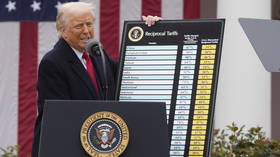China hits back in semiconductor trade war

China has pushed back against US-led efforts to block advances in its chipmaking industry, by slapping restrictions on exports of key raw materials that its Western rivals need for producing semiconductors.
The new export controls, announced on Monday by the Chinese Commerce Ministry, will take effect on August 1 and apply to gallium and germanium – rare metals used in making computer chips and a variety of other products, such as solar panels and advanced radar equipment. Exporters will need “special permission” to ship either of the two metals or their derivative compounds out of China, the ministry said, citing national security interests.
China is the world’s top producer of gallium and is a leading exporter of germanium. The European Union has included both metals on its list of critical raw materials, meaning they are considered “crucial to Europe’s economy.” The US hasn’t produced any gallium since 1987 and relied on China for 53% of its imports of the material between 2018 and 2021, according to the US Geological Survey.
Beijing’s announcement comes just three days after the Dutch government imposed new restrictions on exports of advanced semiconductor equipment, backing US efforts to block China from accessing technology deemed critical to development of artificial intelligence.
Amsterdam’s move drew an angry response from the Chinese government, which claimed that the US was coercing other countries to help maintain its “global hegemony” and implement “semiconductor suppression against China.” Beijing added that the Netherlands should “refrain from abusing export control measures” to help maintain stability of the semiconductor industry’s global supply chain.
The new restrictions on raw materials apparently deliver on China’s warning about the chipmaking supply chain. An editorial published on Monday in the state-owned China Daily newspaper suggested that Beijing’s move was made in retaliation for the curbs imposed by the US and its allies.
“Those doubting China’s decision could ask the US government why it holds the world’s largest germanium mines but seldom exploits them,” the editorial said. “Or they could ask the Netherlands why it included certain semiconductor-related products, such as lithographic machines, into its export control list. It is they that challenge the world supply chain, and the blames that belong to them should never be shifted to China, as it's defending its own legal national interests in this rather uncertain world.”














